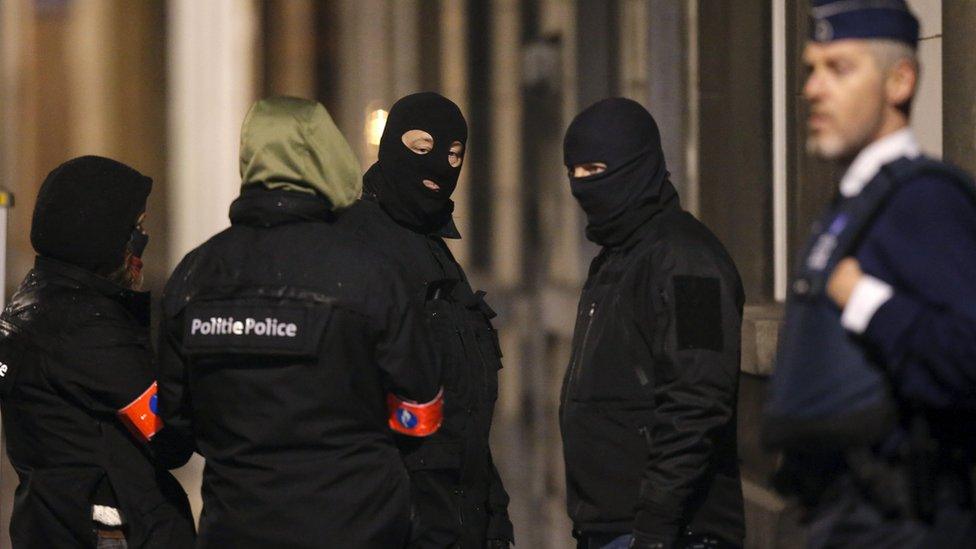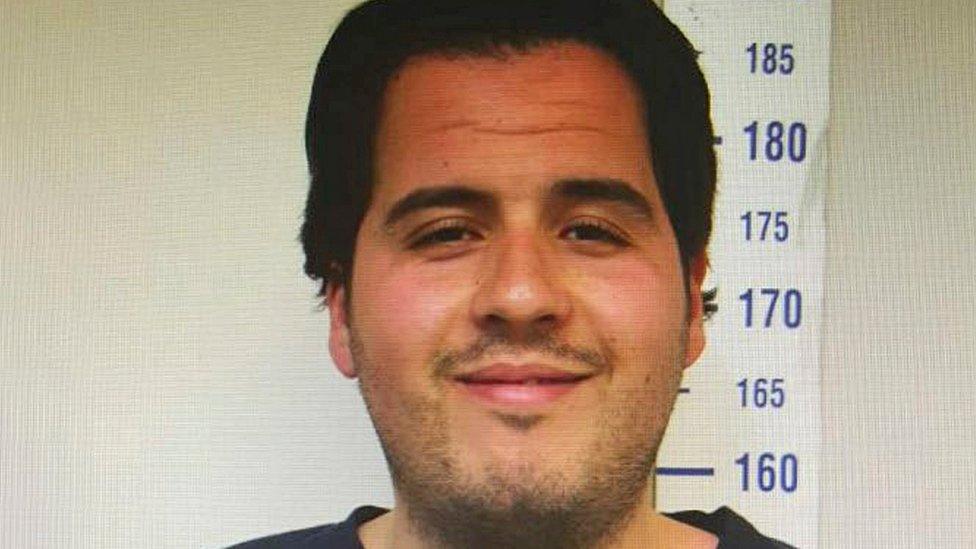Brussels attacks: Belgian police arrest six suspects
- Published
John Kerry: "We will not rest until we have eliminated your nihilistic beliefs... from the face of this earth"
Belgian police have arrested six people in Brussels as a major investigation continues into attacks that claimed 31 lives in the city on Tuesday.
The arrests were made in the Schaerbeek district. Separately, in France, a suspect who was plotting an attack has been arrested near Paris.
The Brussels bombings have been linked to last November's Paris attacks.
US Secretary of State John Kerry, visiting Brussels, said that so-called Islamic State (IS) would be destroyed.
IS claimed the attacks in both Paris and Brussels.
Standing alongside the Belgian Prime Minister, Charles Michel, he expressed condolences for the victims and solidarity with Belgium, declaring "Je suis Bruxellois".
The Western alliance would continue its fight to destroy IS, Mr Kerry said.
"We will not be intimidated. We will not be deterred."

More about the attacks

The arrests in Brussels were made late on Thursday, and followed house-to-house searches. Residents said they heard explosions during the police raids.
Belgian media reports on Friday suggest a seventh arrest has also been made in the Forest district of Brussels.
Also on Thursday evening, French police launched an anti-terrorism operation in Argenteuil, north-west of Paris, following the arrest hours earlier of a man suspected of planning an attack.
Interior Minister Bernard Cazeneuve said the suspected militant, a French national, was in an "advanced stage" of a plot.
The suspect, named as Reda Kriket, 34, was convicted in his absence by a Brussels court last year for recruiting IS members to go to Syria, officials say.
He was sentenced along with Abdelhamid Abaaoud, considered the main organiser of the Paris attacks and killed in a police raid in Paris days later.
Last November, 130 people died after militants opened fire and detonated bombs in a number of locations in the French capital.
Two suspects have also been arrested in north-western Germany in connection with the Brussels investigation, Der Spiegel is reporting.
One, called Samir E, was reportedly detained on Thursday afternoon in the Dusseldorf area and has links with the Brussels metro bomber, Khalid el-Bakraoui.
Another suspect, detained in the Giessen area on Wednesday, had suspicious text messages on his phone on the day of the Brussels bombings.
One, according to Der Spiegel, contained el-Bakraoui's name; the other contained merely the word "end", or "fin" in French.

Masked police secured the entrance to a building in Schaerbeek
The hunt continues for the airport suspect dressed in white, whose identity remains unknown
More details of those killed in the Brussels attacks continue to emerge. Nationals of 40 countries were caught up in the attacks.
Among the deaths confirmed so far:
Three Dutch citizens
Two Americans
One Chinese national
Turkey has said it arrested and deported Brahim el-Bakraoui last June, warning Belgium he was a "foreign fighter" - but the message was "ignored". The Dutch authorities had also been alerted, Ankara said.
The Belgian interior and justice ministers said they had offered to resign over this but added that the prime minister refused to let them.
Brahim el-Bakraoui is one of three men - pictured in the middle on a CCTV image of them - who carried out the bombings at Zaventem airport that killed 11 people.

Brahim el-Bakraoui was arrested in Gaziantep on the Turkey-Syria border
Unconfirmed reports say another of the Brussels airport attackers was the wanted jihadist Najim Laachraoui, whose DNA was found on explosives linked to the attacks in Paris.
The third suspected airport attacker has not yet been identified and is on the run.
Bakraoui's brother, Khalid, struck at Maelbeek metro station, where 20 people died.
There are reports of a second suspect being sought for that attack. One source told AFP news agency that a man with a large bag had been seen beside Khalid el-Bakraoui on surveillance footage at the metro station.
Meanwhile, the Flemish-language public broadcaster VRT reported that investigators were working on the assumption that the cell had been planning a far bigger attack, involving Paris-style shootings as well as suicide bombings.
How Belgians feel about the attacks, in five words
Links have also emerged with Salah Abdeslam, a suspect in the Paris attacks.
Abdeslam was arrested and wounded in a police raid on a flat in Brussels last Friday - four days before the attacks in the Belgian capital.
Investigators say Khalid el-Bakraoui used a false name to rent the same flat.
Abdeslam, a 26-year-old French national born in Belgium, did not have prior knowledge of the Brussels bombings and had stopped co-operating with police following the attacks, his lawyer Sven Mary said.
The director of the EU's police agency, Europol, has told the BBC the network of jihadists in Europe is "more extensive than perhaps we first feared".
Robert Wainwright said there were concerns about "a community of 5,000 suspects that have been radicalised in Europe, that have travelled to Syria and Iraq for conflict experience, some of whom - not all - have since come back to Europe".


Have you been affected by the recent events in Brussels? You can tell us about your experiences by emailing haveyoursay@bbc.co.uk, external.
Please include a contact number if you are willing to speak to a BBC journalist. You can also contact us in the following ways:
WhatsApp: +44 7525 900971
Tweet: @BBC_HaveYourSay, external
Text an SMS or MMS to 61124 (UK) or +44 7624 800 100 (international)